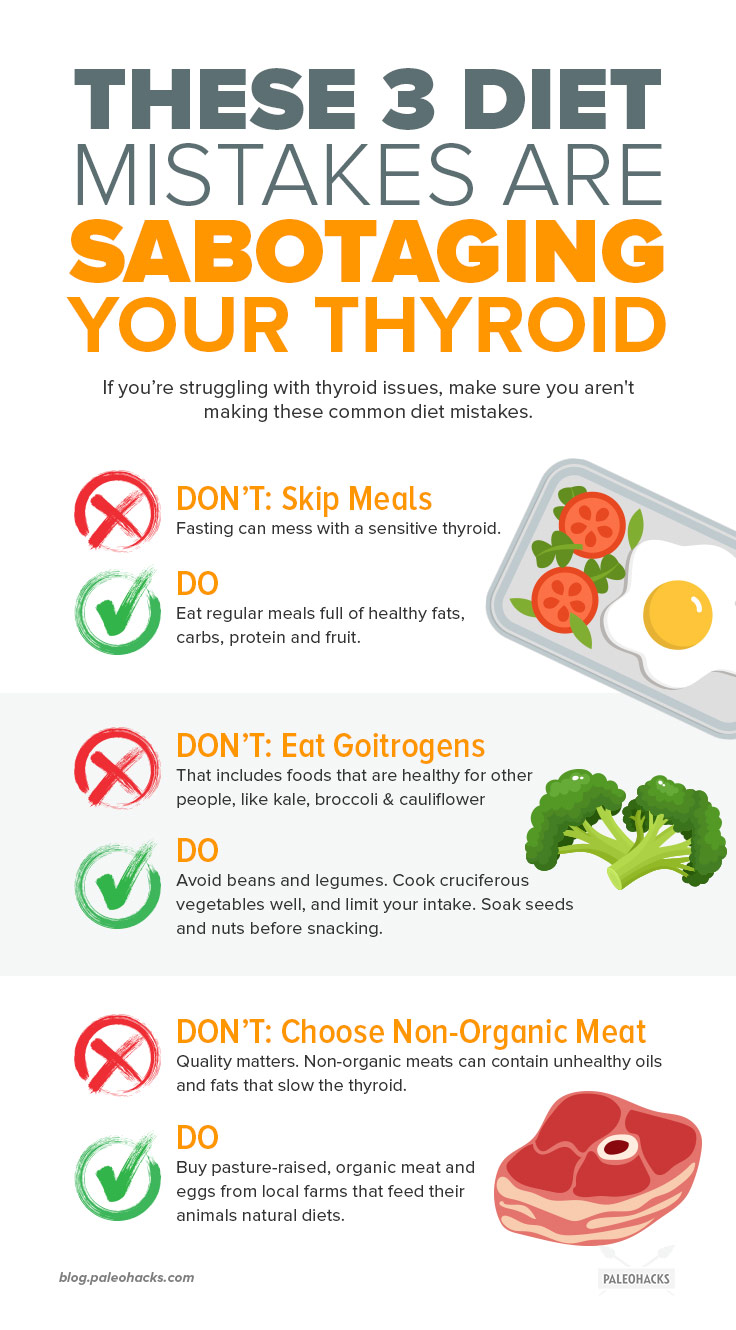If you’re struggling with thyroid issues, make sure you aren’t making these common dietary mistakes.
The thyroid is one of the most important glands in the body. It’s responsible for healthy weight and metabolism, fertility, and even your mood.
There are many things that can affect your thyroid health, like stress, environmental toxins, and body weight, but diet is at the top of the list. What you eat can make a big difference when it comes to treating a thyroid problem.
Are you struggling with a Thyroid condition? We’ve created a FREE guide that shows you how you can heal your thyroid.
Click here to get your FREE copy of our Thyroid Guide!
Even if you’re eating all the right healing foods and getting all the correct nutrients for your thyroid, it won’t matter if you’re making these common dietary oversights. Take a look to make sure you aren’t accidentally countering your good efforts!
3 Mistakes That Can Wreck Your Thyroid
Our thyroid has very specific and unique dietary requirements. It responds well to regular eating patterns, healthy saturated fats, carbohydrates, and other important nutrients. Being aware of the details of what makes your thyroid “tick” is vital for making sure your natural thyroid protocol goes according to plan.
Here are three common dietary mistakes to avoid for optimal thyroid health.
1. Skipping Meals and Restrictive Dieting

The thyroid is the master gland of the metabolism. Its primary job is to regulate your body’s energy (glucose) input and output by communicating with your brain, liver, and other endocrine glands. Your brain tells your thyroid how much energy your body needs, how much is being acquired through food, and how much is being used.
When your body is under stress, its energy requirements greatly increase. This is because stress, like exercise, requires the use of your liver’s glycogen, or energy, to cope. When stress levels are high, liver glycogen gets depleted. (1)
If you’re fasting or eating a low-carb diet, those important liver glycogen stores deplete rapidly. Glucose, the simple sugar derived from carbohydrates, acts as both direct fuel for the thyroid and glycogen for the liver. Considering your liver is responsible for converting up to 70% of your inactive thyroid hormone (T4) into its active form (T3), when its glycogen stores run low, this causes your thyroid to slow down. (2) The reason for this is simple: When liver glycogen runs low, your body perceives this as a food-scarcity and downregulates your thyroid and metabolism in an attempt to save your energy, rather than spend it.
While this is a great survival response, it creates new problems for your thyroid. Avoiding carbs and natural sugars (like from fruit) will slow your metabolism and cause symptoms such as: (3, 4)
- Poor circulation and low body temperature
- Fatigue
- Weight gain
- Hair loss
- Dry skin
- Puffiness from water retention
Solution: Eat regular meals full of healthy fats, carbs, protein, and fruit. If you’re prone to thyroid issues, avoid low-carb dietary plans.
2. Eating Goitrogenic Veggies, Beans and Seeds

Kale, broccoli, cauliflower, beans and seeds, all healthy foods, right? Not so fast. If you suffer from thyroid problems, especially low thyroid, you’ll want to proceed with caution.
These foods are known as goitrogens, meaning they have an anti-thyroid effect on the body. Cruciferous vegetables, legumes, and most seeds are all highly goitrogenic in their raw form, meaning they slow thyroid function.
Note: legumes and beans are best avoided for their general difficult-to-digest nature. Even when cooked, they can have an anti-thyroid effect. (5)
Solution: Avoid all beans and legumes. Be sure to cook all cruciferous vegetables well, and moderate your consumption. Before you snack on seeds and nuts, activate them through soaking or sprouting to rid them of their natural anti-nutrients.
3. Choosing Non-Organic Meat

When shopping for beef, chicken and other meat, always look for pastured, organic or grass-fed options.
Quality matters, and here’s why: Factory-farmed animals are fed diets rich in corn, wheat, soy, and other grains. The oils in these grains are polyunsaturated, which can slow thyroid function. (6) Grain-fed animals tend to accumulate more polyunsaturated fat in their body fat and tissues, which we acquire second hand.
It’s also not uncommon for the grains and legumes that the animals eat to be sprayed with toxic pesticides, which act as endocrine disruptors that interfere with normal thyroid hormone metabolism and function. (7, 8)
Solution: Seek out local, organic farms that feed their animals grass and other natural diets.
The Bottom Line
Proper nutrition is vital for good thyroid health. If you’re having thyroid issues, it’s important to identify and remove any triggers that could interfere with the way your thyroid functions.

(Read This Next: 5 Essential Oils to Boost Thyroid Health & How to Use Them)


 One-Pan Paleo Chicken Paprikash
One-Pan Paleo Chicken Paprikash









Show Comments